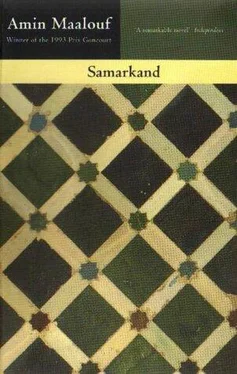Hassan Sabbah had imitated the eagle. He had searched the length and breadth of Persia for somewhere to gather, teach and organize his faithful. He had learnt from his misadventure in Samarkand that it would be unrealistic to try and seize a large city, for confrontation with the Seljuks would be immediate and would inevitably turn out to the empire’s advantage. He thus needed something else, a mountain redoubt which was inaccessible and impregnable, a sanctuary from which he could develop his activity in all directions.
Just as the flags captured in Transoxania were being unfurled in the streets of Isfahan, Hassan was in the vicinity of Alamut. The site had been a revelation for him. From the moment he first saw it from in the distance, he understood that it was here, and nowhere else, that his task would be accomplished and that his kingdom would arise. Alamut was at that time one fortified village among so many others, where a few soldiers lived with their families along with some artisans, farmers and a governor, named by Nizam al-Mulk, who was a courageous nobleman called Mahdi the Alawite, whose only concerns were his irrigation water and his harvest of nuts, raisins and pomegranates. The turmoil taking place in the empire did not disturb his slumber.
Hassan started by sending out some companions, local men, to join the garrison, preach and convert. Some months later they were ready to announce to the master that the ground was prepared and that he could come. Hassan turned up disguised as a Sufi dervish as was his practice. He strolled around, inspecting and checking everything. The governor received the holy man and asked him what would please him.
‘I need this fortress,’ said Hassan.
The governor smiled, thinking that the dervish certainly did not lack humour. His guest, however, was not smiling.
‘I have come to take possession of this place. I have won over all the men of the garrison.’
The outcome of this exchange was, admittedly, as extraordinary as it was incredible. Orientalists, who have consulted the chronicles of the time, particularly the accounts set down by the Ismailis, needed to read and re-read them in order to reassure themselves that they were not the victims of a hoax.
Indeed, let us take another look at the scene.
It was the end of the eleventh century, or to be exact 6 September, 1090. Hassan Sabbah, the brilliant founder of the Order of the Assassins, was about to take over the fortress which was to be, for 166 years, the seat of the most fearsome sect in all history. Now, there he was, seated cross-legged in front of the governor, to whom he was saying, without raising his voice:
‘I have come to take possession of Alamut.’
‘This fortress has been given to me in the Sultan’s name,’ the governor replied. ‘I have paid to obtain it.’
‘How much?’
‘Three thousand gold dinars!’
Hassan Sabbah took a piece of paper and wrote: ‘Pay the sum of three thousand gold dinars to Mahdi the Alawite for the fortress of Alamut. May God meet our needs, for He is the best of protectors.’ The governor was unsettled and did not think that the signature of a man dressed in homespun might be honoured for such a sum. However, when he arrived in the city of Damghan, he was able to cash his gold without any delay.
When news of the taking of Alamut reached Isfahan it aroused little concern. The city was much more interested in the conflict which was currently raging between Nizam and the palace. Terkan Khatun had not pardoned the Vizir for the operation he had conducted against her family’s preserve. She urged Malikshah to rid himself of his overpowerful Vizir with no further ado. For the Sultan to have had a tutor upon his father’s death she pronounced absolutely normal as he was then only seventeen years old; today he was thirty-five, an accomplished man, and he could not leave the management of affairs indefinitely in the hands of his ata; it was time for people to know who the real master of the empire was! Had the Samarkand business not proved that Nizam was trying to impose his will, that he was tricking his master and treating him as a minor before the whole world?
Malikshah was still hesitant about taking this step when something happened to push him into it. Nizam had named his own grandson governor of the city of Merv. This conceited adolescent held too much store by his grandfather’s omnipotence, and had gone so far as to insult an old Turkish emir in public. The emir then came in tears to complain to Malikshah, who beside himself with rage had the following letter written to Nizam there and then: ‘If you are my aide, you must obey me and forbid your relatives to malign my men; if you deem yourself my equal, my associate in power, I will make the necessary decisions.’
Nizam sent back his response to the message, which had been conveyed by a delegation of the empire’s high dignitaries: Tell the Sultan, if he was not aware of it until now, that I am indeed his associate and that without me he would never have been able to build up his power! Has he forgotten that it was I who took charge of his affairs upon his father’s death, that it was I who eliminated the other aspirants and crushed all rebels? That it is thanks to me that he is obeyed and respected to the ends of the earth? Yes, go and tell him that the fate of his head is tied to that of my inkwell!’
The emissaries were dumbfounded. How could a man as wise as Nizam al-Mulk address the Sultan with words which would cause his downfall, and without doubt his death? Could his arrogance have gone over into madness?
That day, only one man knew with precision how to explain such determination and that was Khayyam. For weeks Nizam had been complaining to him of dreadful pains which had been keeping him awake at night and preventing him from concentrating on his work by day. After examining him, probing his body with his fingers and questioning him, Omar diagnosed a phlegmonic tumour which would not leave him long to live.
It was a truly unpleasant night when Khayyam had to announce to his friend his true condition.
‘How much time do I have left to live?’
‘A few months.’
‘Will I go on suffering?’
‘I could prescribe you opium to reduce the suffering, but you will feel constantly dizzy and unable to work any more.’
‘Will I not be able to write?’
‘Nor hold a long conversation.’
‘Then I prefer to suffer.’
Between one retort and the next there were long moments of silence and suffering contained with dignity.
‘Are you afraid of the hereafter, Khayyam?’
‘Why should one be afraid? After death there is either nothing or forgiveness.’
‘And the evil that I have wrought?’
‘However great your faults, God’s mercy is greater.’
Nizam seemed somewhat reassured.
‘I have also done good. I have built mosques and schools and have fought against heresy.’
As Khayyam did not contradict him, he went on:
‘Will I be remembered in a hundred years’ time, in a thousand years’?’
‘There is no knowing.’
Nizam stared at him hard with distrust, and then continued:
‘Was it not you who said one day: “Life is like a fire. Flames which the passer-by forgets. Ashes which the wind scatters. A man lived.” Do you think that will be the fate of Nizam al-Mulk?’
He gasped for breath. Omar had still not said anything.
‘Your friend Hassan Sabbah has gone throughout the country broadcasting that I am no more than a vile servant of the Turks. Do you think that is what they will say about me tomorrow, that they will make me into the scourge of the Aryans? Will they have forgotten that I was the only person to have stood up to sultans for thirty years and to have imposed my will upon them? What else could I do after their armies’ victory? But you are not saying anything.’
Читать дальше












